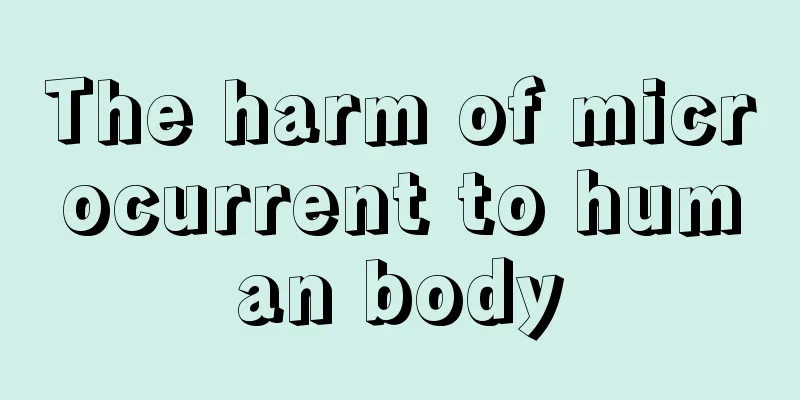The distress signal sent by the five internal organs

|
What are the chances of a person suffering from a "serious disease" in his lifetime? According to medical experts' calculations based on the incidence of various single diseases in the population, the probability is approximately 70%-80%. As the saying goes, "When illness strikes, it's like a mountain falling down," but before your five internal organs get sick, they will actually send you small signals for help. 1. Heart disease Cardiovascular disease is the number one disease affecting human health, and one-third of deaths worldwide are related to it. Li Mingzhou, chief physician of the Department of Cardiology at Beijing Hospital of the Ministry of Health, told reporters that the "distress signals" sent by the heart include the following: 1. Feeling anxious and short of breath when doing any activity: Often feel anxious and chest tightness, and will become breathless and have a faster heartbeat when climbing stairs or doing some simple physical work. Especially if this situation was not obvious before but has worsened in recent period, you should be careful about heart problems. 2. Pain in left fingers and teeth: The pain of heart disease often occurs in the center of the chest, lasting for several minutes or even more than ten minutes, and often involves the left forearm, left fingers or left upper arm, or even the throat, neck or teeth. However, what people generally think of as left shoulder or back pain is actually quite rare. 3. You can only fall asleep with a high pillow: When you sleep, if you feel chest tightness when lying flat and have to use a high pillow or half-lean to fall asleep, it indicates that your heart function is weak. 2. Liver Disease Liver disease is called the "biggest silent killer" because it has no symptoms in the early stages of the disease. However, experts say there are still some small signals that we can capture. 1. Feeling nauseous when seeing greasy food: The liver is the largest digestive gland in the human body. When there is a problem with it, it is mostly manifested in "eating", such as loss of appetite, not wanting to eat, nausea and vomiting when seeing greasy food or smelling oil, and stomach bloating and discomfort. It may be hepatitis. If you have pain in the right upper abdomen (lower edge of the right rib) after eating greasy food, and it also spreads to the right shoulder or back, it may be a gallbladder disease (cholecystitis, gallstones, etc.). 2. Yellow face and itchy skin: When the liver is sick, the metabolism of bile will be impaired, causing the bilirubin in the blood to increase, causing color changes in the body, such as yellow face, yellow eyes, yellow skin, and yellow urine. Itching of the skin may also occur because the bile salts in the bile stimulate the sensory nerve endings of the skin. 3. Red palms: The thenar eminence, hypothenar eminence and palms of the fingers are red and congested, as if they were covered with a layer of rouge, which indicates the possibility of chronic hepatitis and cirrhosis. There is also a type of "spider nevus" that is bright red and looks very much like a spider. It often appears on the face, neck, back of the hands, upper arms, chest and shoulders. 3. Gastrointestinal diseases The most common sign of gastrointestinal disease is pain. Professor Yuan Weijian, chief physician of the Department of Gastroenterology at Xiangya Hospital of Central South University, pointed out that different locations of pain indicate different gastrointestinal diseases. 1. Pain after eating: The pain occurs half an hour to two hours after a meal and disappears before the next meal. It is usually caused by gastric ulcer. 2. Pain when hungry: Pain occurs 3-4 hours after a meal, when you are on an empty stomach or feel hungry. The pain will be relieved or disappear after eating something. This is usually a duodenal ulcer. Some patients also experience night pain. 4. Lung diseases: The lung lobes are also called "delicate organs" because they are very delicate and will cause uncontrollable coughing at the slightest stimulation. Professor Wang Jinglan, chief physician of the Respiratory Department of Peking Union Medical College Hospital, said that coughing is actually a distress signal sent by your lungs. Different cough symptoms indicate different lung diseases, especially unexplained and long-term coughs, which should be taken seriously. 1. Dry cough: no sputum or very little sputum. This is usually the early stage of acute pharyngitis and bronchitis. Some lung cancer patients may also experience this symptom. 2. Acute and sudden cough: often caused by foreign bodies in the bronchi. 3. Long-term chronic cough: chronic bronchitis, tuberculosis, etc. If you cough up blood in sputum, you should be alert to lung cancer; if you cough up yellow sputum, it is usually due to infection in the lungs or bronchi. 4. Low fever in the afternoon: may be tuberculosis. It is characterized by fever in the afternoon, which subsides in the afternoon or evening, rising and falling like the tide, and is accompanied by fatigue, loss of appetite, cough and a small amount of hemoptysis. 5. Kidney disease When talking about kidney disease, many people think of renal failure. In fact, diabetes, high blood pressure, and certain medications can damage your kidneys. A survey shows that nearly 20% of kidney disease patients have reached the middle or late stage of their disease when they first visit the doctor due to lack of knowledge on prevention and treatment. Professor Lu Fangping, director of the Department of Nephrology at the First Affiliated Hospital of Tsinghua University, pointed out that the kidneys’ distress signals include the following: 1. Sudden increase in urine volume: The living habits have not changed, but the urine volume suddenly increases or decreases, or you did not urinate much at night before, but now you urinate frequently and in large amounts at night, which exceeds the daytime urine volume. This is an early sign of poor kidney function. 2. Urine color change: The color of urine is the "barometer" of the kidneys. When it is dark tea color, meat washing water color, soy sauce color, or turbid like rice washing water, you should be alert to kidney problems. 3. There is foam in the urine: especially small foam that is not easy to disappear, which means that more protein is excreted in the urine. 4. Edema of the face and lower limbs: After getting up in the morning, the eyelids, face, or lower limbs swell up and the swelling does not disappear after 20 minutes of activity. This edema will also worsen after fatigue. 5. Ammonia smell in the mouth: accompanied by fatigue, loss of appetite, and anemia, it is often a symptom of mid-to-late stage kidney disease. But according to clinical statistics, more than 85% of the well-known low back pain is not caused by kidney disease. |
<<: Stay away from nine foods that really cause cancer
>>: 10 diseases that parents can pass on to their children
Recommend
The harm of orthodontic treatment is loosening is the most serious
Nowadays, many people go for orthodontic treatmen...
Smelly teeth? So this is the reason
Some people in life have smelly teeth, but they d...
Prostate cancer treatment options
In the general impression of people, cancer means...
How to clean white cotton clothes when they turn yellow
Buying clothes has become a common thing in today...
6 things restaurants will never tell you
Finding a good restaurant and having a good meal ...
Why is prostate cancer called a rich man's disease? Two aspects to understand prostate cancer
The prostate is an important male reproductive or...
How long after a meal can I take a shower?
Taking a bath is something people do frequently. ...
What are the symptoms of uterine tumors?
Spring is the beginning of all things, giving peo...
What effects does tooth extraction have on the body
After the age of 20, many young people find that ...
What's wrong with black stools caused by rectal cancer?
What happens if rectal cancer causes black stools...
The process of pregnancy
Pregnancy is a very wonderful process. In the pas...
What should we pay attention to when drinking water?
Water is the source of life and people cannot liv...
The difference between red pomelo and grapefruit
During the traditional Mid-Autumn Festival, some ...
How to keep your hands from freezing
Every time winter comes, the temperature is very ...
What are the dangers of washing your hair with cold water
When the weather is hot, many people like to wash...









